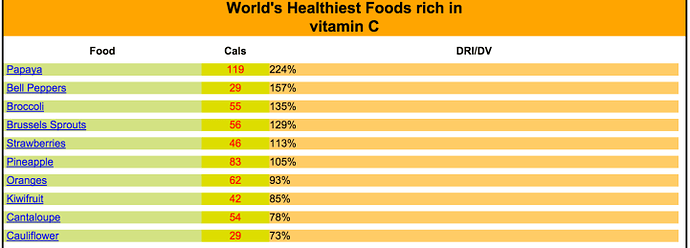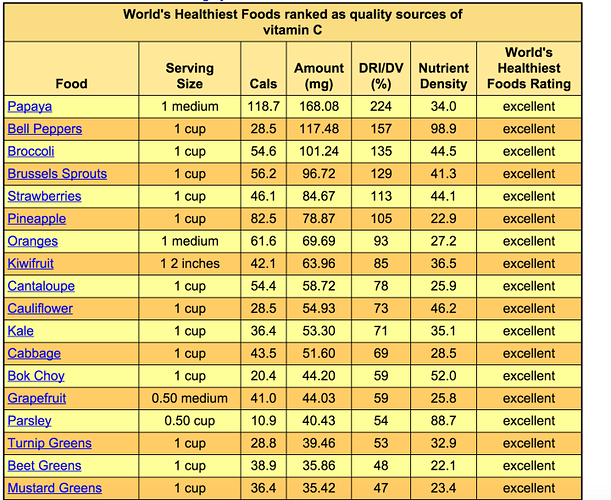I beg to add in a few points IAN.
Importance of having raw foods is mainly because vitamin C is very prone to damage by heat, oxygen, and storage over time. In fact, the relative instability of vitamin C in foods presents a compelling argument in favor of fresh food dietary approaches.
Some people claim we can't get high doses of vitamin C in our diet by food alone? Well there is "food and food"
- The vitamin C content of food will start to decline as soon as it is picked,
- even though this decline can be slowed down and minimized by cooling and retention of the food in its whole form.
- But a fresh, vitamin C-rich vegetable like broccoli—if allowed to sit at room temperature for 6 days—can lose almost 80% of its vitamin C.
- Same goes for oranges, limes and almost any food.
- Long-term storage of vegetables can cost a significant amount of vitamin C. Kept frozen for a year, kale can lose half its vitamin C or more.
- Canning is even more detrimental, with 85% of the original vitamin C lost over the same year.
While cooking will lower the amount of vitamin C in most foods, but the amount of vitamin C lost will vary widely by cooking method. For example, basket-steaming broccoli for 15 minutes will reduce the vitamin C content by nearly one quarter.
The DRI/DailyValue of some fresh, whole vegetables currently estimated between 96 milligrams per day for man, and for women in the U.S. twenty years and older, it is 82 milligrams per day.
As you can see they reach very high percentages with relative few calories.
Here are again some numbers and portions.
Supplements do play a beneficial but NOT and NEVER exclusive role.
It again boils down to the quality of the manufacturer making the supplements.
For instance 'superfoods' which have become a relative trendy hype do indeed provide higher doses of Vitamin C (assuming they are very qualitative). We can choose to supplement for a different vary of reasons. Maybe time/easiness and for prevention or cure.
The high doses you describe can be reached with a mix of superfoods, well-chosen and well-stored foods and some supplementation.
We must also mention: that certain foods and other factors can inhibit the same absorption: may it be coffee, alcohol, stress factors, gluten, pollution, soy-derived foods, processed transfats, etc.etc.
Key again is to think holistically rather than treating the symptom in a separated way only.
We can throw as many vitamin c in our body, if we don't complete "the protocol" with a proper lifestyle design and change, no amount will and can be completely helpful in the recovery.


